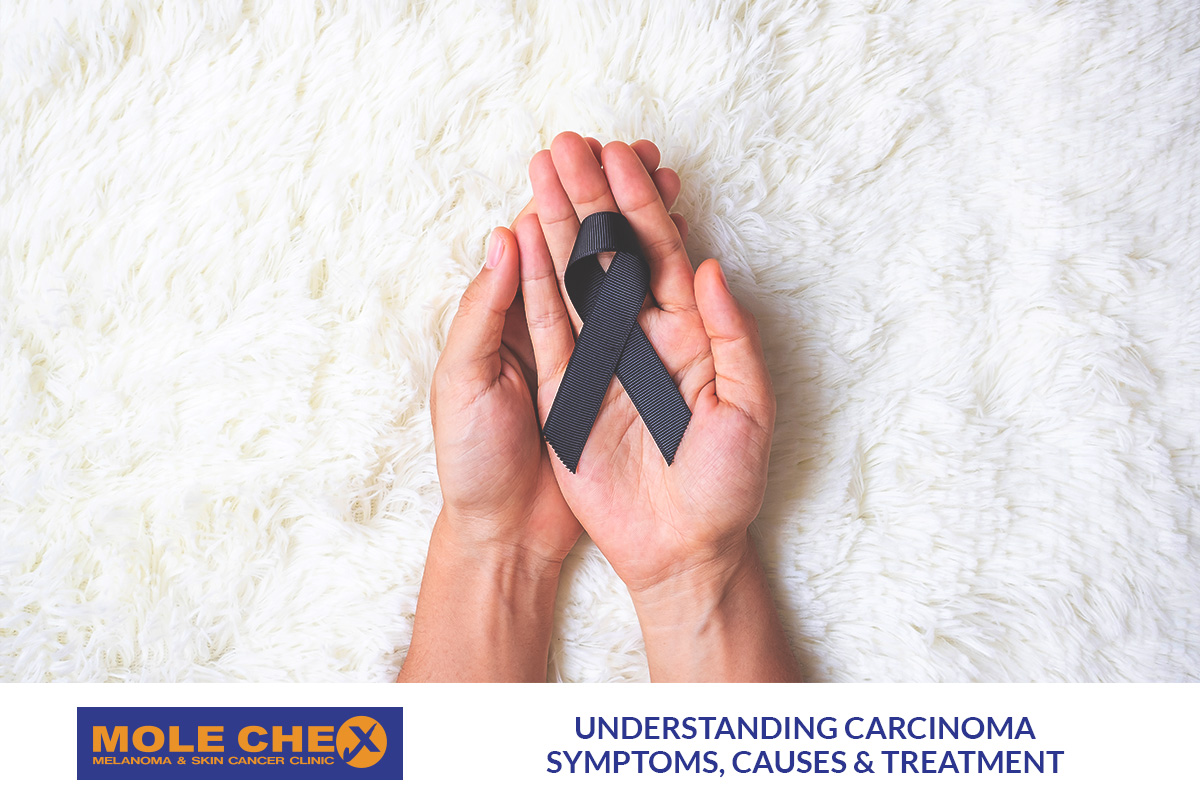Understanding Carcinoma: Symptoms, Causes and Treatment

Carcinoma is one of the most common types of cancer, originating in epithelial cells that form the outer layer of the skin and the lining of internal organs. It accounts for a large proportion of cancer diagnoses worldwide. Early detection and an understanding of carcinoma can significantly improve outcomes, making it vital to recognise its symptoms, causes and available treatments.
What is Carcinoma?
Carcinoma begins when epithelial cells, responsible for forming protective linings in the body, mutate and grow uncontrollably. These abnormal cells can invade surrounding tissues and spread to other parts of the body through the bloodstream or lymphatic system. Carcinoma can develop in various organs, including the skin, lungs, breasts, prostate, liver and kidneys.
Types of carcinoma include:
- Basal Cell Carcinoma (BCC): The most common form of skin cancer, often caused by prolonged sun exposure.
- Squamous Cell Carcinoma (SCC): Found on the skin and in organs such as the lungs and throat.
- Adenocarcinoma: Arises in glands and is common in the breast, prostate, pancreas and colon.
- Renal Cell Carcinoma: Affects the kidneys and is the most common type of kidney cancer.
- Small Cell Carcinoma: Often linked to lung cancer, it is aggressive and spreads quickly.
Symptoms of Carcinoma
Symptoms vary depending on the type and location of the carcinoma but often include:
Unexplained Weight Loss
Sudden, significant weight loss without dietary or lifestyle changes can indicate an underlying issue such as carcinoma.
Persistent Pain or Discomfort
Chronic pain in a specific area, such as the abdomen, chest, or bones, may suggest cancer’s progression.
Changes in Skin or Lesions
Skin carcinomas often present as:
- Persistent sores that do not heal.
- New growths or lumps.
- Changes in moles or freckles, such as increased size, irregular borders, or varied colours.
Fatigue
Cancer can drain the body’s energy, leading to persistent and unexplained fatigue that does not improve with rest.
Unusual Bleeding or Discharge
Symptoms such as blood in the stool, urine, or sputum can signal internal carcinomas.
Altered Bowel or Bladder Habits
Frequent diarrhoea, constipation, or a change in stool appearance may indicate colon or rectal cancer.
Lumps or Thickening in the Body
A lump in the breast, under the skin, or in the abdomen warrants immediate medical evaluation.
Causes and Risk Factors
Carcinoma results from genetic mutations in epithelial cells, but certain risk factors can increase the likelihood of developing this cancer:
Lifestyle Factors
- Tobacco Use: Smoking or chewing tobacco significantly raises the risk of lung, mouth and throat carcinomas.
- Dietary Habits: Diets high in processed foods and low in fruits and vegetables can contribute to some types of cancer.
Environmental Factors
- Sun Exposure: Prolonged UV radiation exposure is the leading cause of skin cancers like basal and squamous cell carcinoma.
- Exposure to Carcinogens: Chemicals such as asbestos, arsenic, or industrial toxins increase cancer risk.
Infections
Certain infections are linked to carcinoma:
- HPV (Human Papilloma virus): Associated with cervical, throat and anal cancers.
- Hepatitis B and C Viruses: Increase the risk of liver cancer.
Genetic Predisposition
Family history of certain cancers can make individuals more susceptible to carcinomas, especially breast, ovarian and colon cancers.
Age and Gender
Some carcinomas, like prostate cancer, are more common in older men, while breast cancer primarily affects women.
Diagnosis of Carcinoma
Early detection is key to successful treatment. Diagnostic methods include:
- Physical Examination: Identifying lumps, skin changes, or other abnormalities.
- Imaging Tests: CT scans, MRIs, X-rays, or ultrasounds to detect tumour size and spread.
- Biopsy: Removing a small sample of tissue for laboratory analysis to confirm the presence of cancerous cells.
- Blood Tests: Identifying tumour markers or abnormalities.
Treatment Options for Carcinoma
Treatment depends on the type, locatio and stage of the carcinoma. Key approaches include:
Surgery
Surgical removal of the tumour is often the first step in treating carcinomas. Surgeons aim to excise all cancerous tissue while preserving as much healthy tissue as possible.
Radiation Therapy
High-energy radiation targets and kills cancer cells, often used in combination with surgery or for tumours that cannot be surgically removed.
Chemotherapy
Powerful drugs attack cancer cells throughout the body, making this treatment effective for carcinomas that have spread.
Targeted Therapy
This approach uses drugs designed to specifically target cancer cell mechanisms, minimising harm to healthy cells.
Immunotherapy
Immunotherapy boosts the body’s natural defences to fight cancer, particularly effective in certain aggressive carcinomas like melanoma or lung cancer.
Hormone Therapy
Used for hormone-sensitive cancers such as breast or prostate carcinoma, this treatment blocks hormones that fuel cancer growth.
Prevention of Carcinoma
While not all carcinomas are preventable, you can reduce your risk through the following:
- Avoid Tobacco: Eliminating smoking significantly lowers the risk of many cancers.
- Use Sun Protection: Apply sunscreen and wear protective clothing to reduce UV exposure.
- Maintain a Healthy Diet: A balanced diet rich in fruits, vegetables and whole grains supports overall health.
- Get Vaccinated: Vaccines like HPV and Hepatitis B can prevent infection-linked cancers.
- Schedule Regular Screenings: Early detection is crucial, especially for high-risk individuals.
Conclusion
Carcinoma can affect various parts of the body, but understanding its symptoms and causes empowers you to take proactive steps. With advances in diagnostic tools and treatments, many forms of carcinoma are treatable, especially when caught early. If you notice any warning signs or have risk factors for carcinoma, consult a healthcare professional promptly. Early action can make all the difference in managing and overcoming this condition.
Learn more by reading other articles :



